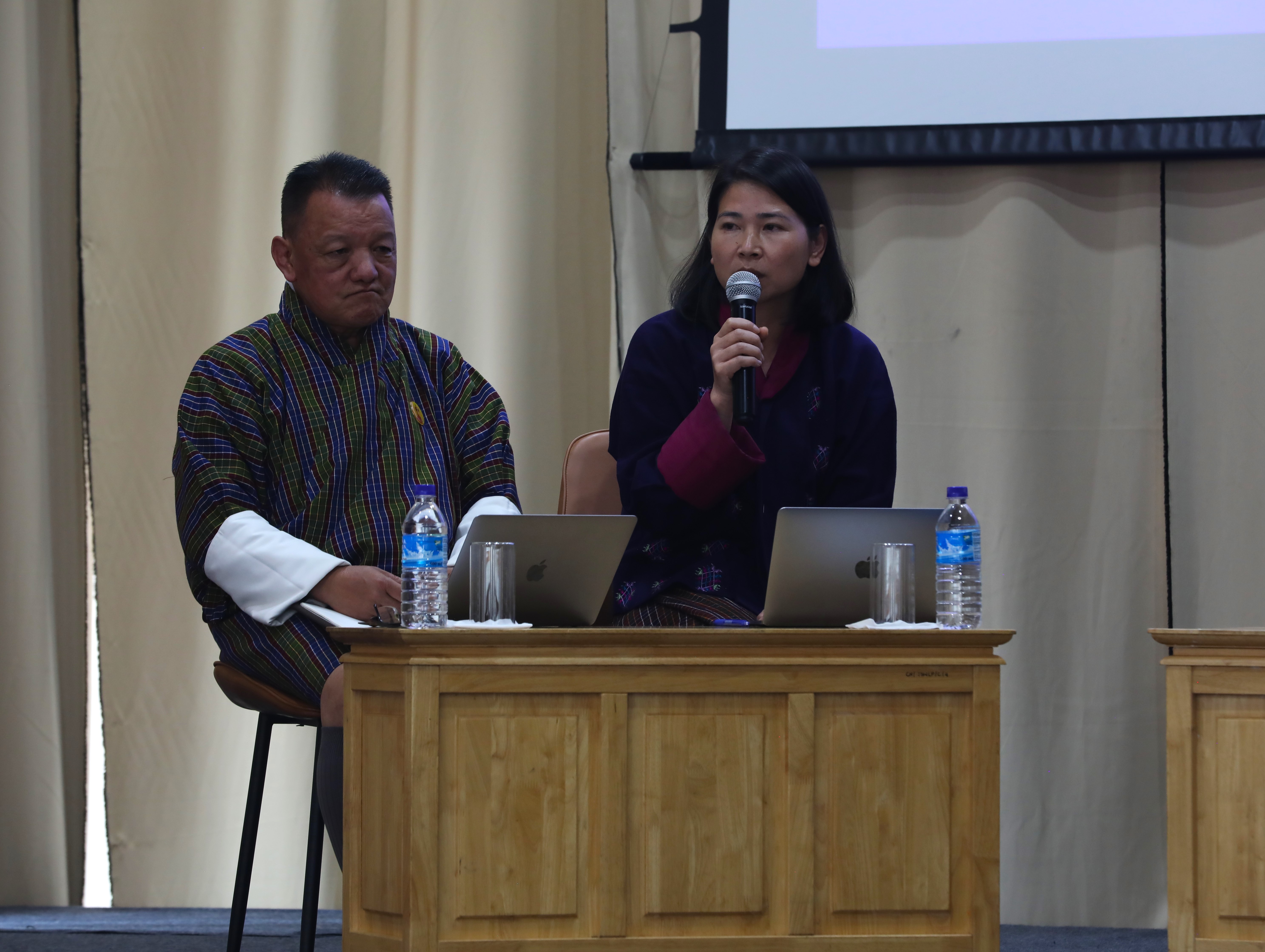Boosting domestic resource mobilization has become critical as Bhutan transitions to a low-middle income country even as it strives to achieve both its national development goals and the SDGs
Bhutan’s first national tax dialogue discusses opportunities and challenges to domestic resource mobilization
July 9, 2024

The panellists for the TAX for SDG discussion with Mohammad Younus, the Resident Representative, UNDP
Bhutan’s first National Tax Dialogue held on 13 May, provided a platform for exchanging ideas and engaging in discussions on the challenges posed by the country’s current tax system. It brought together representatives from the Department of Revenue and Customs and other government agencies, academia, and development partners to explore solutions to strengthening the national tax system, with the aim to ensure enhanced social justice, improved tax compliance, and a renewed social contract between the state and citizens for sustainable development. The Dialogue was co-organized by the Jigme Singye Wangchuck School of Law and UNDP.

A student asking a question following the panel discussion that engaged relevant stakeholders
“The tax system in Bhutan faces challenges in terms of tax policy reforms, tax administration, and digitization. Tax polices instituted in 2001 are still in effect despite the evolving times, skilled tax officers are burdened with manual data entry, and online tax system frequently encounters technical difficulties,” said Sonam Jamtsho, the Director General of Department of Revenue and Customs (DRC).
In response to these challenges, the Director General said the DRC is actively pursuing tax reforms. “We are working on the revision and simplification of the Income Tax Act. We are also looking into incorporating new provisions concerning Foreign Direct Investments (FDIs). Moreover, Large Taxpayer Units have been established and are currently being piloted.”

Students of Jigme Singye Wangchuck School of Law attending the event
Laila Abdul Latif, Technical Expert for UNDP’s Tax for SDGs and one of the facilitators of the dialogue, highlighted the importance of introducing digital taxation for e-commerce.
“As the digital economy grows, it is essential for Bhutan to adapt its tax system to capture the value created by online transactions and ensure a level playing field for businesses operating in both the traditional and digital sectors. By implementing a value-added tax (VAT) on goods and services tax (GST) on digital services, requiring e-commerce platforms to collect and remit taxes on behalf of sellers, and establishing a threshold for taxing low-value imports, Bhutan can generate additional revenue to fund its development priorities.”
UNDP Resident Representative Mohammad Younus highlighted the recent UNESCAP’s SDGs progress report for Asia and the Pacific Region, which indicated that the region would achieve only one-third of the necessary progress by 2030.
“These findings have a profound impact on our societies and economies. Therefore, the report is a call to action—a blueprint for transforming our world by eradicating poverty, safeguarding the environment, and fostering prosperity for all. However, realizing this ambitious agenda requires substantial financial resources and taxation plays a pivotal role in this context,” he stated.

The Dialogue was co-organized by the Jigme Singye Wangchuck School of Law and UNDP.
Tax revenue remains the most sustainable source of revenue for governments and the most viable means to raise finances towards the SDGs, reducing dependence on international assistance and contributing to the repayment of burdensome debt.
Dorji Lhamo, Chief Planning Officer at the Royal University of Bhutan, and a member of the National Commission for Women and Children’s gender expert group emphasized the importance of integrating gender perspectives in tax policies and administration.
“Academicians have a unique opportunity to conduct research on gender impact analysis of tax policies. The insights gained from such studies can inform the creation of an inclusive, efficient, and sustainable tax policies. By leveraging tax policy reforms, we can promote gender equality and align fiscal policies with the SDGs to foster sustainable growth.”
Following the Tax Dialogue, a day-long training on Tax and the SDGs was held for the members of parliament, as well as a two-day training for tax administrators and representatives from the academia.
The Tax for SDGs initiative, part of UNDP’s Sustainable Finance Hub, is supporting Bhutan in its efforts to leverage taxation to bridge the development financing gap and accelerate the attainment of the SDGs. In August 2023, the Tax for SDGs initiative brought together the country’s tax administrators, policy makers and relevant key stakeholders to look at how well-targeted tax and fiscal policy can encourage behavioural changes that could help realize desired environmental and gender equality outcomes in support of SDG 5 (Gender Equality) and SDG 13 (Climate Action).

The national tax dialogue on tax, justice, improved compliance, and a renewed social contract for the SDGs
In November 2023, in collaboration with The South Centre, an intergovernmental policy research think-tank, the Tax for SDGs initiative trained tax officials on tax treaty negotiation, tax treaty policy formulation and the creation of a tailored country-specific tax treaty model. It was the first such workshop for the Bhutanese tax officials and came at a time when the country is looking at entering new tax treaties while at the same time working towards attracting more FDIs. The training enabled the tax officials to understand the importance of Tax Treaties as well as proposing terms that are favourable for the country’s long-term economic development.
The Bhutan National Tax Dialogue, a collaboration between the Ministry of Finance, Department of Revenue and Customs and UNDP, was part of a series of initiatives undertaken through UNDP’s Tax for SDGs initiative. A similar dialogue was held in Nigeria as well as in Sri Lanka.
For media contact:
Ms Norbu Choksum Zangmo, Communications Consultant | Email: norbu.zangmo@undp.org

 Locations
Locations